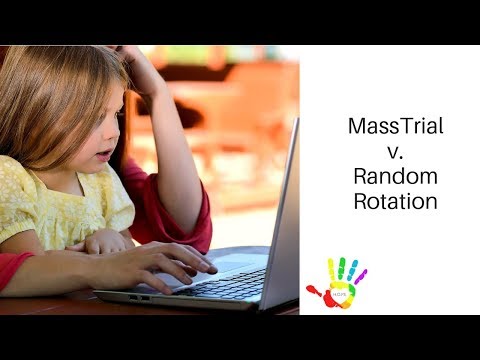A new video will be posted to this series weekly. Subscribe so you do not miss a video and send video requests or questions to [email protected]
Credits:
Photo: Morguefile
Sound effect: Incomputek
Intro: Graeme Kan
Video Production: Nathan Bedford
Disclaimer:
This video is intended for information purposes only. It is not intended to diagnose or treat any medical condition. The text, graphics, images, flash movies, and audio segments are not intended to be a substitute for professional medical advice, diagnosis, or treatment. Always seek the advice of your physician or other qualified health provider with any questions you may have regarding a medical condition.
The information contained in this segment is generalized. It may not be applicable in every situation. Before applying specific interventions, consult a behaviorist. Any behavior intervention can result in an undesired change in behavior if not implemented correctly. No client relationship is established as a result of watching these videos. Jessica Leichtweisz and Hope Education cannot be held responsible for any misuse of the information contained in these videos. <br> <h3>Auto Generated Captions</h3>
[Music]
hi and welcome back to help education
services video series on autism and ABA
my name is Jessica likewise and I’m the
CEO of hope education services and I’ve
been in ABA therapists for ten years now
what I’m really passionate about is
getting families the information they
need to know to make sure their children
get the best treatment so tonight I got
a question about what’s the difference
between mashed trial and random
rotations if your child’s receiving a BA
your ABA therapists is probably using
discrete trial training in some form or
the other
so mass trial it refers to in discrete
trial training when a child is being
asked the same question over and over in
a row so the same questions being asked
in a row so for example I was using mass
trial I would say what is it and the
child would answer it’s a ball then they
get their reinforcer or we use an error
correction if they didn’t get the get it
correct if I’m using mass trial I’ll ask
the same question again what is it Bob
so I’m going to continuously ask that
question usually a predetermined number
of times that can be five to ten times
depending upon the learner and the
decision of the therapist or the
supervisor on the case and eventually
we’ll move on so typically when you’re
using mass trial it’s in the beginning
stages of a program target or in a
learner’s repertoire of ABA programs and
the repetition allows the child to have
enough access to the question to learn
so the repetition can be really good now
random rotation refers to when you’re
mixing multiple targets together so if
I’m teaching to label things like in the
example I just had I would say what is
it they would say ball and if they got
it correct I would probably move on to a
different response what is it
balloon what is it present so in this
case on rotating the
targets and I’d be asking them
continuously usually in order for a
target to be considered mastered it has
to be in random rotation because the
children have to be able to use the
skill all the time not just when they’re
answering the questions in succession
you know more and more when I first
started a BA I was taught to always
teach things initially in mass trial and
more and more I’m starting to think mass
trial may not be the way to go for all
learners and I’m actually using it less
and less in my own practice and with the
clients that I work with typically even
if I’m doing mass trial I’ll usually use
more than one target at the same time
more and more in my own ABA practice I’m
using mass trial less and less what I
find is that by asking the same question
over and over learners get bored and
even confused sometimes they change
their responses when you’re asking
questions this over and over and
repetition because they think well if
you’re still asking a question I must
have given the wrong response so even
though I was initially taught when I
first started training in ABA to use
math trial all the time
now I’ve reserved it for really really
difficult things and for learners that
are really struggling with specific
targets but I myself like to teach
everything in random rotation now so I
hope that answers your question about
what the difference is and whether or
not you should be using mass trial or
random rotation for your children and in
your program if you have any of the
questions you want me to tackle just
email me at Jessica at Jessica leg wise
comm I’m passionate about helping you to
get your children the best treatment
there is and if I can I will make a
video for you don’t forget to check out
our other videos on YouTube and on
Facebook have a great night
[Music]
you
Mass Trial v. Random Rotation 7wdKABRJkXw
[Music]
hi and welcome back to help education
services video series on autism and ABA
my name is Jessica likewise and I’m the
CEO of hope education services and I’ve
been in ABA therapists for ten years now
what I’m really passionate about is
getting families the information they
need to know to make sure their children
get the best treatment so tonight I got
a question about what’s the difference
between mashed trial and random
rotations if your child’s receiving a BA
your ABA therapists is probably using
discrete trial training in some form or
the other
so mass trial it refers to in discrete
trial training when a child is being
asked the same question over and over in
a row so the same questions being asked
in a row so for example I was using mass
trial I would say what is it and the
child would answer it’s a ball then they
get their reinforcer or we use an error
correction if they didn’t get the get it
correct if I’m using mass trial I’ll ask
the same question again what is it Bob
so I’m going to continuously ask that
question usually a predetermined number
of times that can be five to ten times
depending upon the learner and the
decision of the therapist or the
supervisor on the case and eventually
we’ll move on so typically when you’re
using mass trial it’s in the beginning
stages of a program target or in a
learner’s repertoire of ABA programs and
the repetition allows the child to have
enough access to the question to learn
so the repetition can be really good now
random rotation refers to when you’re
mixing multiple targets together so if
I’m teaching to label things like in the
example I just had I would say what is
it they would say ball and if they got
it correct I would probably move on to a
different response what is it
balloon what is it present so in this
case on rotating the
targets and I’d be asking them
continuously usually in order for a
target to be considered mastered it has
to be in random rotation because the
children have to be able to use the
skill all the time not just when they’re
answering the questions in succession
you know more and more when I first
started a BA I was taught to always
teach things initially in mass trial and
more and more I’m starting to think mass
trial may not be the way to go for all
learners and I’m actually using it less
and less in my own practice and with the
clients that I work with typically even
if I’m doing mass trial I’ll usually use
more than one target at the same time
more and more in my own ABA practice I’m
using mass trial less and less what I
find is that by asking the same question
over and over learners get bored and
even confused sometimes they change
their responses when you’re asking
questions this over and over and
repetition because they think well if
you’re still asking a question I must
have given the wrong response so even
though I was initially taught when I
first started training in ABA to use
math trial all the time
now I’ve reserved it for really really
difficult things and for learners that
are really struggling with specific
targets but I myself like to teach
everything in random rotation now so I
hope that answers your question about
what the difference is and whether or
not you should be using mass trial or
random rotation for your children and in
your program if you have any of the
questions you want me to tackle just
email me at Jessica at Jessica leg wise
comm I’m passionate about helping you to
get your children the best treatment
there is and if I can I will make a
video for you don’t forget to check out
our other videos on YouTube and on
Facebook have a great night
[Music]
you
https://i.ytimg.com/vi/7wdKABRJkXw/hqdefault.jpg Autism,ABA,Behavior therapy,Behaviour therapy,Applied behavior analysis,Applied behaviour analysis,special education,hope education services,jessica leichtweisz A new video will be posted to this series weekly. Subscribe so you do not miss a video and send video requests or questions to [email protected]
Credits:
Photo: Morguefile
Sound effect: Incomputek
Intro: Graeme Kan
Video Production: Nathan Bedford
Disclaimer:
This video is intended for information purposes only. It is not intended to diagnose or treat any medical condition. The text, graphics, images, flash movies, and audio segments are not intended to be a substitute for professional medical advice, diagnosis, or treatment. Always seek the advice of your physician or other qualified health provider with any questions you may have regarding a medical condition.
The information contained in this segment is generalized. It may not be applicable in every situation. Before applying specific interventions, consult a behaviorist. Any behavior intervention can result in an undesired change in behavior if not implemented correctly. No client relationship is established as a result of watching these videos. Jessica Leichtweisz and Hope Education cannot be held responsible for any misuse of the information contained in these videos.

